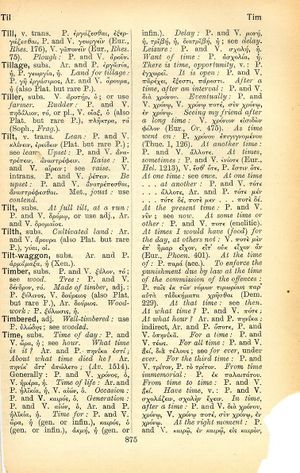tilt: Difference between revisions
From LSJ
Ζήσεις βίον κράτιστον, ἢν θυμοῦ κρατῇς → Vives bene, si sis vacuus iracundia → Am besten lebst du, wenn du deinen Zorn beherrschst
(Woodhouse 5) |
(CSV5) |
||
| Line 1: | Line 1: | ||
{{ | {{Woodhouse1 | ||
| | |Text=[[File:woodhouse_875.jpg|thumb|link={{filepath:woodhouse_875.jpg}}]]'''v. trans.''' | ||
<b class="b2">Lean</b>: P. and V. κλίνειν, ἐρείδειν (Plat. but rare P.); see [[lean]]. | |||
<b class="b2">Upset</b>: P. and V. ἀνατρέπειν, ἀναστρέφειν. | |||
<b class="b2">Raise</b>: P. and V. αἴρειν; see [[raise]]. | |||
V. intrans. P. and V. ῥέπειν. | |||
<b class="b2">Be upset</b>: P. and V. ἀνατρέπεσθαι, ἀναστρέφεσθαι. | |||
Met., <b class="b2">joust</b>: use <b class="b2">contend.</b> | |||
'''subs.''' | |||
<b class="b2">At full tilt, a run</b>: P. and V. δρόμῳ, or use adj., Ar. and V. [[δρομαῖος]]. | |||
}} | }} | ||
Revision as of 10:07, 21 July 2017
English > Greek (Woodhouse)
v. trans.
Lean: P. and V. κλίνειν, ἐρείδειν (Plat. but rare P.); see lean.
Upset: P. and V. ἀνατρέπειν, ἀναστρέφειν.
Raise: P. and V. αἴρειν; see raise.
V. intrans. P. and V. ῥέπειν.
Be upset: P. and V. ἀνατρέπεσθαι, ἀναστρέφεσθαι.
Met., joust: use contend.
subs.
At full tilt, a run: P. and V. δρόμῳ, or use adj., Ar. and V. δρομαῖος.

